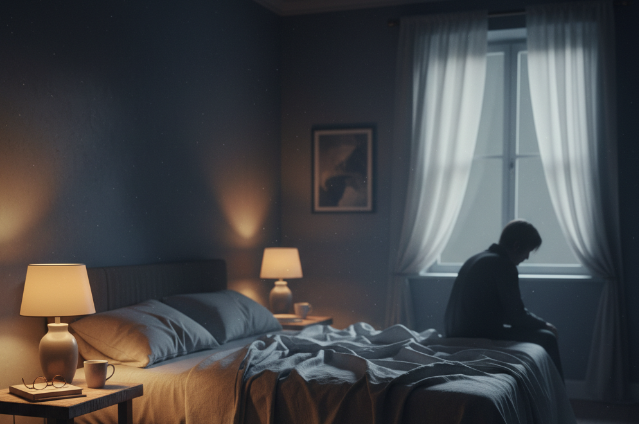
There is a reason I don’t like sleep. It takes away the intensity of my emotions, the sharpness of memory, the rawness of grief. At night, when I finally close my eyes, I feel as if I am letting go of something I should have held on to. And in the morning, when I wake, it feels like betrayal - the force of last night’s feelings has dulled, blurred at the edges, sometimes even erased.
We are taught to think of sleep as purely restorative. Psychiatry frames it as a measure of stability: how many hours, how deep, how uninterrupted. Families worry if you don’t get “enough.” Capitalism insists that sleep is useful only when it prepares you to be productive the next day. In all these narratives, sleep is understood as necessary, wholesome, and natural. Rarely do we hear that sleep can also be a kind of violence, a quiet erasure of intensity.
When I was younger, sleep was safety. As a child, it gave me a place to escape the noise of the world. But as I grew older, and especially after my diagnosis, I began to feel differently. Mania made sleep feel like an enemy - it tried to cut short the hours of clarity, rush, and energy that felt more alive than anything else. Depression made sleep into a trick: I could pass entire days in bed, unconscious, only to wake and find that nothing had changed except that I was more distant from myself. In both states, sleep felt like a thief.
There are nights when grief overwhelms me, when suicidal thoughts crowd the room, when I carve words into my notebook as if language can keep me alive. In those moments, the intensity is unbearable, yes, but it is also real. To sleep is to dissolve it, to let the heaviness turn into something foggy and unreal by the morning. Even memories get reconfigured in the haze of dreams. Something inside me resists that softening. I want to feel what I feel, in its sharpest form, without sedation or forgetting.
And yet, psychiatry insists on sleep. Pills are prescribed not only to lift moods but to knock you out. A good night’s rest is treated as evidence of progress. When I was in the ward, nurses would monitor and record how many hours I had slept, as if sleep itself was proof of recovery. I wanted to scream that it wasn’t. Sometimes I slept because the medication forced me to. Sometimes I didn’t want to wake up at all. The numbers never told the truth of my relationship with the night.
To call this “the politics of sleep” may sound strange, but sleep is not neutral. Who gets to sleep peacefully, and who doesn’t, is shaped by structures of power. Workers denied rest in the name of profit. Women kept awake by unpaid labor. Survivors lying awake with trauma. Patients are coerced into sedation so their pain is easier to manage. Even in something as seemingly natural as sleep, hierarchies and control operate quietly.
For me, the politics of sleep shows up most starkly in psychiatry. Sleep becomes a measure of compliance. If I sleep well, I am “better.” If I don’t, I am “relapsing.” This framework leaves no room for my truth - that sleep feels like a kind of silencing, a flattening of intensity. The system doesn’t ask whether I want to hold on to my highs, or whether I need the sharp edge of grief to write, to remember, to stay tethered to myself. It only asks if I slept eight hours, if I swallowed the pills, and if I am functional enough to be left outside the ward.
But here’s the paradox: I also need sleep. Without it, my body collapses. Sleep deprivation pushes me deeper into mania, makes me reckless, even more suicidal. I cannot deny that sleep keeps me alive. It steadies me just enough to study law, to sit through lectures, to write essays like this one. And yet, each time I surrender to it, I wonder what I have lost. The intensity I crave does not survive the night intact.
Perhaps this is why I think of sleep as political and philosophical at once. It is not just about bodies resting but about what gets erased in the process. If the smell of old books carries the scent of decay, then sleep carries the taste of forgetting. It preserves life at the cost of experience. And the question I keep returning to is: what does it mean to survive if survival itself feels like betrayal?
Mainstream psychiatry celebrates stability. Anti-psychiatry sometimes romanticizes sleepless ecstasy. I belong to neither camp. I exist in the contradiction: alive because of sleep, but diminished by it. I do not want the world to sedate me into being manageable. But I also do not want to burn out completely. That middle space - between surrender and refusal - is where I live.
In a way, sleep teaches me the same lesson as grief or writing: that nothing can be held forever. Memories blur, feelings fade, intensity wanes. To resist sleep is to resist impermanence. To surrender to it is to admit that I cannot hold on to everything, no matter how much I want to. Perhaps that is its cruelest lesson: that survival means letting go, even when I don’t want to.
The politics of sleep, then, is not just about who gets rest and who doesn’t. It is also about whose intensities are allowed to remain, and whose must be softened for the sake of survival. For me, sleep will always be both enemy and necessity, thief and guardian. It is the place where life insists on continuity, but only by dulling what I most want to feel.
And that is why, even as I close my eyes tonight, I will resist.
